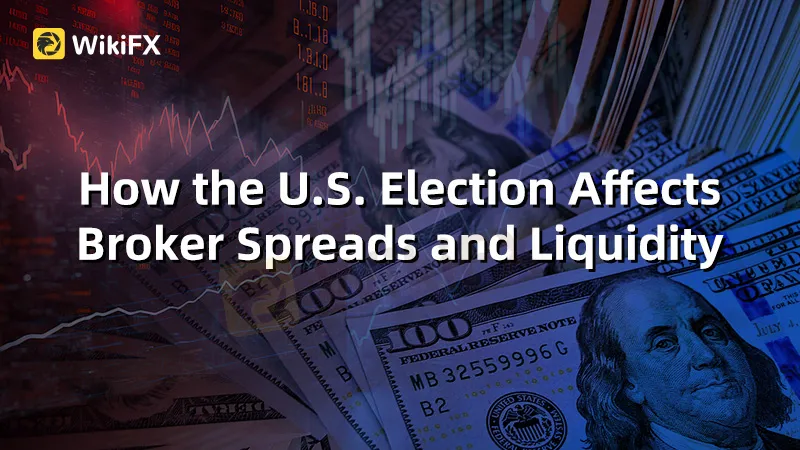简体中文
繁體中文
English
Pусский
日本語
ภาษาไทย
Tiếng Việt
Bahasa Indonesia
Español
हिन्दी
Filippiiniläinen
Français
Deutsch
Português
Türkçe
한국어
العربية
How the U.S. Election Affects Broker Spreads and Liquidity
Abstract:The U.S. presidential election is a significant event that can impact financial markets in various ways. For traders, understanding how election outcomes influence broker spreads and liquidity is crucial for strategic decision-making. This article explores the mechanisms behind these changes and offers insights for navigating the trading landscape during election periods.

The U.S. presidential election is a significant event that can impact financial markets in various ways. For traders, understanding how election outcomes influence broker spreads and liquidity is crucial for strategic decision-making. This article explores the mechanisms behind these changes and offers insights for navigating the trading landscape during election periods.
Political events often introduce a layer of uncertainty in financial markets. During election cycles, especially in a highly polarized environment, traders may react by adjusting their positions based on anticipated outcomes. This volatility can lead to wider spreads, as brokers increase their pricing margins to account for the heightened risk associated with fluctuating market conditions.
For instance, as election day approaches, market participants often speculate on which candidate will win and how their policies might affect various sectors of the economy. This speculation can result in increased trading volumes, driving demand for liquidity. However, the increased risk can also deter traders from entering positions, causing liquidity to dry up in certain market segments.
Broker spreads—the difference between the bid and ask price—are a reflection of market sentiment and liquidity. During an election, brokers might widen their spreads to mitigate the risk of price swings that can occur in response to election results or related news. For example, if a candidate favoured by the market appears to be losing ground in the polls, brokers may react by adjusting their spreads to account for potential price declines.
Moreover, different asset classes may respond differently to election outcomes. Equities, forex, and commodities each have unique sensitivities to political developments. Traders focusing on foreign exchange may see spreads widen particularly during significant news announcements, such as election results or major policy speeches, reflecting the uncertainty surrounding currency valuations.
Liquidity, or the ease with which assets can be bought or sold without affecting their price, is often challenged during the lead-up to the U.S. election. As traders await the outcome, many may adopt a wait-and-see approach, leading to lower trading volumes. This diminished activity can exacerbate the widening of spreads, as brokers may struggle to match buyers and sellers efficiently.
Additionally, the type of election—presidential, midterm, or local—can influence liquidity dynamics. Presidential elections tend to draw more attention and trading activity due to their broader implications for national policies. In contrast, midterm elections might see less market impact, though volatility can still arise if significant changes in Congress are anticipated.
Once the election results are announced, markets often experience a period of adjustment. Depending on the outcome, traders may quickly reassess their strategies, leading to rapid buying or selling. This post-election volatility can cause spreads to narrow again as liquidity returns and brokers adapt to the new market conditions.
However, if the election outcome is contested or leads to prolonged uncertainty—such as legal challenges or recounts—brokers may maintain wider spreads for an extended period. This cautious approach helps them manage the risks associated with unpredictable price movements.
In summary, the U.S. election significantly influences broker spreads and liquidity, with both pre-election speculation and post-election reactions shaping market dynamics. Traders should remain vigilant during these periods, understanding that the heightened volatility can present both challenges and opportunities. By staying informed about political developments and their potential impacts on financial markets, traders can better navigate the complexities of trading during election seasons.

Disclaimer:
The views in this article only represent the author's personal views, and do not constitute investment advice on this platform. This platform does not guarantee the accuracy, completeness and timeliness of the information in the article, and will not be liable for any loss caused by the use of or reliance on the information in the article.
Read more

Elderly Ipoh Man Loses Nearly RM1 Million in Online Investment Scam
An elderly man in Ipoh, Malaysia, has fallen victim to an online investment scam, losing RM974,000 in the process. The 67-year-old’s ordeal came to light after he lodged a report with the Ipoh district police on January 11, 2025.

Housewives Scammed of Over RM1 Million in Gold Investment Fraud
A fraudulent gold investment scheme has caused significant financial losses for 44 individuals, predominantly housewives, in Kelantan, Malaysia. The victims, collectively, have lost over RM1 million to the scheme, according to the Malaysia International Humanitarian Organisation (MHO).

Data to Watch This Week
Last week, U.S. employment data significantly exceeded expectations, further solidifying market expectations that the Federal Reserve will not be making aggressive interest rate cuts. This week, the focus shifts to important economic data and the start of earnings season.

Confirmed! US December non-farm payroll exceeded expectations
Last Friday, the U.S. Bureau of Labor Statistics released strong employment data, further diminishing market expectations for interest rate cuts by the Federal Reserve this year. Currently, the market widely expects the Fed to begin cutting rates again in October.
WikiFX Broker
Latest News
How to Automate Forex and Crypto Trading for Better Profits
Wolf Capital Exposed: The $9.4M Crypto Ponzi Scheme that Lured Thousands with False Promises
Confirmed! US December non-farm payroll exceeded expectations
Is Infinox a Safe Broker?
How Did the Dollar Become the "Dominant Currency"?
400 Foreign Nationals Arrested in Crypto Scam Raid in Manila
Singapore Blocks Polymarket Access, Following U.S. and France
OneZero Collaborates with Ladies Professional Golf Association (LPGA)
Housewives Scammed of Over RM1 Million in Gold Investment Fraud
Massive Hawala Scam: Rs 10,000 Crore Routed Abroad
Currency Calculator






